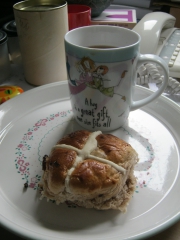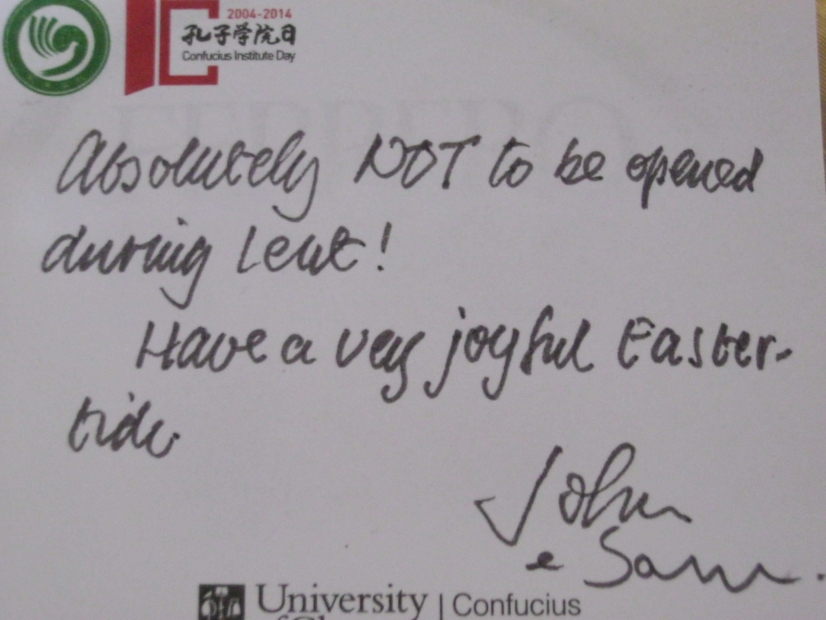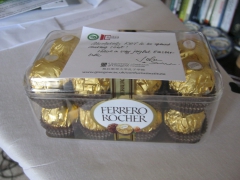... the mug of tea and a hot cross bun when all the work is finally done!
A Skinny Fairtrade Latte in the Food Court of Life - Page 398
-
Lesser Know Liturgy for Good Friday...
-
40 Acts - Day 40
Writing off debts - one way of understanding the events of Good Friday is the cancellation of our debt to God. Today we are invited to think of other debts - finanacial or emotional - and to write them off, or even consciously to bless the person we think is in our debt!!
Good Friday is good because we get something undeserved. Freedom; a clean slate; a fresh beginning. Maybe today is a good day to extend the favour? Cancel an IOU and write off a debt that's owed to you today. It might be a tenner you loaned someone, a promise as yet unfulfilled or something more significant that caused a rift in the past. In the words of Frozen's Elsa, 'Let it go.'
START SMALL:
Does someone owe you a few quid? Did they forget about it? Draw a line under it and forget about it too.
A LITTLE MORE CHALLENGING:
Double it up. That thing you did/that money you lent/that extra time you put in and didn't see any return on? Bless that person again; double the blessing.
THE WHOLE HOG:
Once you've cancelled any physical debts, think about the emotional ones you might be holding onto. Have you got grudges or grievances against anyone? Forgive them today. It's not easy, but it's liberating.
-
40 Acts - Day 38
Someone has a warped sense of humour - telling us to make ourselves more open, more vulnerable on a day where I really need my vicar head! So, today as I collar up and head east to help conduct the funeral of a friend, I will be putting these challenges on hold...
Armour off, folks. Today is about vulnerability. Sometimes we need to let our guard down to allow others to do the same. Everyone has their own struggle, and sharing those stories can often open up a generous way for others to talk about theirs.
I'VE GOT 5 MINUTES
Be honest. Are you really 'fine, thanks'? Is everything 'good, yeah, really good!'? If it is, happy days! If not, don't just say the words. Think before you answer; try to give a really honest response where appropriate, and show others that you're genuinely interested in their answer too.
I’VE GOT 15 MINUTES:
Journals at the ready! Jesus experienced and reflected a full range of human emotions; so perhaps spend some time reading these short passages and writing down the things that speak to you: John 11:17-37, Matthew 26:36-46.
I'VE GOT 30 MINUTES
Got a testimony? Write it down or share it with someone today. Alternatively, tell a story about yourself to someone who's going through similar things in their life – your experience might provide help or reassurance that everything will be OK.
-
40 Acts - The Unexpected
At the start of the 40 Acts thingy, I posted small bars of chocolate through the doors of all my neighbours.
Yesterday I found a box of chocs on my doormat with the above note... how lovely. And totally unexpected.
-
40 Acts - Day 37
A tricky balance being attempted here - on All Fools Day, when pranks and jokes abound, the suggestion to come alongside someone for whom life is not a barrel of laughs and endeavour to bring them a smile.
Can I mention P. P is "someone I know" through the world of cancer and who now faces a terminal prognosis. As she undergoes aggressive tratment that might buy her more time, she shares the slightly crazy practice of the support groups she is in whereby everyone jumps into her pockets to travel with her to appointments. Each day she fills those imaginary pockets with fresh supplies of sweets and cakes to sustain her supporters. It generates a smile. It reassures her that she is not alone. That fine line is negotiated effectively.
Here is today's challengeThe guy who created the Knock Knock jokes deserves a 'no bell' prize (Ba-dum-tsch! You're welcome, we're here all week, etc. ...) Today is April Fool's Day, so feel free to steal that dreadful joke if you've got no others up your sleeve. For some people, though, today won't be particularly bright and breezy. Some people are carrying heavy burdens. Could you try to lift someone's load today, and make life a little lighter?
LET'S GO:
Be kind, be aware, be educated. An ongoing attitude of 'kindness first' is a good first step. A small shift in your awareness can make all the difference on a daily basis. And it's a great idea to read up on things like depression, anxiety and other mental health issues, so that you're equipped to support people around you.
GET ACTIVE:
Can you think of someone in particular who won't be laughing today? Think of ways you might be able to make them smile in the next 24 hours. You might want to tell them it's not an April Fool!
GO ALL OUT:
Could you commit to stand by someone in their struggles beyond just today? There are few things more incredible than knowing someone is standing shoulder to shoulder with you when you're facing tough times. Let someone know you're not going anywhere.


